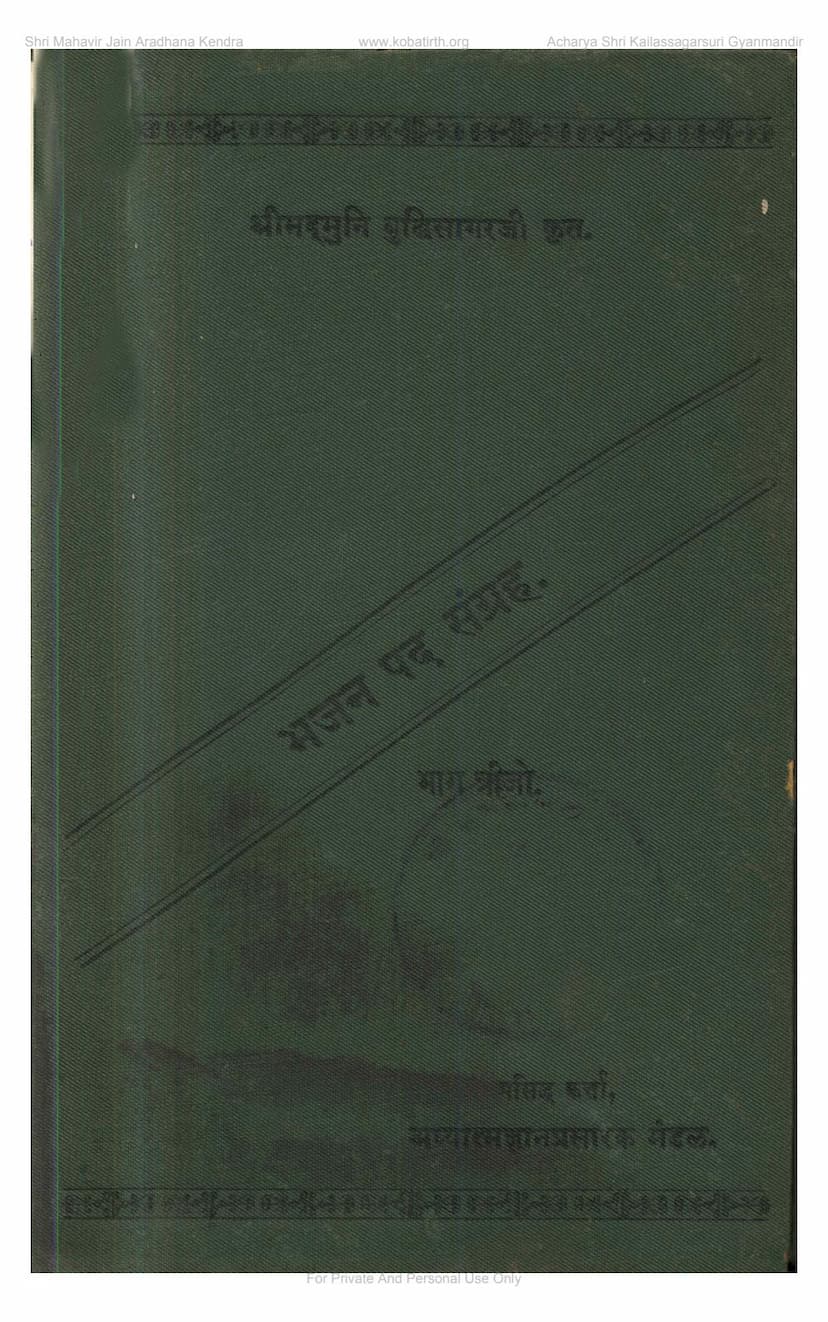Bhajanpad Sangraha Part 03
Added to library: September 1, 2025

Summary
This Jain text, "Bhajanpad Sangraha Part 03" by Buddhisagar, is a collection of devotional songs, hymns (stotras), and spiritual discourses aimed at guiding the reader towards self-realization and liberation according to Jain principles.
Here's a summary of its key aspects based on the provided pages:
Core Philosophy and Purpose:
- Spiritual Upliftment: The primary goal of the book is to elevate the spirit through devotion and contemplation of the soul's true nature. It emphasizes the importance of "Atma Dharma" (soul-religion) and the worship of knowledge, perception, and conduct.
- Expression of Inner Feelings: The songs and verses are described as expressions of "inner feelings and aspirations" that arise from contemplating the soul and the divine. They are intended to provide support and inspiration to others on the spiritual path.
- Realization of the Soul: The text guides readers towards understanding and realizing the self as a divine entity ("Paramatma"). It aims to foster "Uchchabhava" (higher feelings) which lead to the soul becoming "Paramatmarupa" (in the form of the Supreme Soul).
- Path to Liberation: The collection highlights that liberation (Moksha) is achieved through knowledge and action ("Gyan-kriya"). Devotional singing ("Bhajan") is presented as a means to attain supreme knowledge ("Param Bodh").
Content and Structure:
The book is a compilation of various spiritual compositions, including:
- Stanzas for Tirthankaras (Chovishi & Vishi): A significant portion of the book is dedicated to hymns and praises for the 24 Tirthankaras (Chovishi) and the 20 currently living Tirthankaras (Vishi). These compositions likely describe their virtues, teachings, and spiritual achievements.
- Spiritual Discourses (Swadhyay): Several sections are labeled as "Swadhyay" (self-study or discourse), which likely contain philosophical explanations, ethical teachings, and guidance on spiritual practices.
- Thematic Compositions: The content covers various spiritual themes such as:
- Renunciation of worldly entanglements ("Khatpat Tyag").
- Contemplation of the transient nature of the world ("Asaar Sansar").
- The importance of the present moment ("Vartaman Kal Sudharo").
- The nature of the soul ("Atmaswarup").
- Spiritual powers and their cultivation ("Chetan Shakti").
- Devotion to the Guru ("Gurubhakti").
- Ethical conduct and righteousness ("Niti Shiksha", "Vyavahar Dharma").
- Conquering negative emotions and desires ("Vishay Vikar Jay").
- The path of knowledge and wisdom ("Jnana").
- Detachment and renunciation ("Vairagya").
- The principles of Jainism ("Jain Dharma").
- Geographical and Temporal Context: The preface provides details about the origin of many compositions, linking them to specific locations (e.g., Mansa, Rirol, Mehsana, Limb, Jotana, Bhoyani, Ahmedabad) and specific periods (e.g., Chaturmas in 1964 VS). This indicates the author's itinerant life and the inspiration drawn from various experiences and encounters.
Key Principles and Themes:
- Importance of the Present Moment: The text stresses the significance of the present time for spiritual progress, advising to focus on present actions rather than dwelling on the past or worrying about the future.
- Self-Effort and Inner Strength: The emphasis on "Atmodhyam" (self-effort) suggests that liberation is achieved through one's own spiritual endeavors and the cultivation of inner strength.
- Theories of Knowledge and Reality: Mentions of "Nayas" (standpoints or perspectives) and "Syadvada" indicate an engagement with Jain philosophical concepts concerning the nature of reality and knowledge.
- Ethical Conduct and Virtue: The collection underscores the importance of virtuous living, detachment from worldly attachments, and the pursuit of knowledge and wisdom.
- The Role of the Guru: The text highlights the crucial role of a Guru (spiritual teacher) in guiding the seeker towards true knowledge and liberation.
Compilation and Publication:
- Author: The book is attributed to Muni Buddhisagar.
- Publisher: Adhyatma Gyan Prasarak Mandal.
- Financial Support: The publication was made possible through the support of Seth Maganalal Karamchand Prantijwala and Seth Ladhábhái Chámpasíbhai Katchanaliya.
- Printing: Printed at Shri Satya Vijay Printing Press in Ahmedabad in 1909 CE (Samvat 2435).
In essence, "Bhajanpad Sangraha Part 03" is a rich resource for Jain spiritual seekers, offering a devotional and philosophical path towards self-understanding, ethical living, and ultimately, liberation. It serves as a testament to the author's spiritual journey and his desire to share profound Jain teachings through devotional poetry and prose.